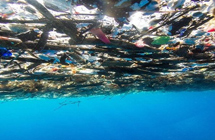这照片让人震惊!加勒比海被塑料垃圾“活埋”
|
A photographer has captured the damage being done to the planet's oceans with a shocking “sea of plastic and styrofoam” image taken near a tranquil Caribbean island. Caroline Power, the photographer, said witnessing the plastic blanket of forks, bottles and rubbish between the islands Roatan and Cayos Cochinos, off the coast of Honduras, was “devastating”. “To see something that I care so deeply for being killed, slowly choked to death by human waste was devastating,” she told The Telegraph.
“Once the trash is in the ocean, it is incredibly difficult and costly to remove. The key is to stop the trash before it enters the ocean. The worst of the rubbish the dive team found was about 15 miles off the coast of Roatan heading towards the Cayos Cochinos Marine Reserve. “We were on a dive trip to a set of islands that don't quite break the ocean surface. They are one of the most pristine dive sites in this part of the Caribbean,” Ms Power recalled. “The photo of the diver in the water was actually over one of these seamounts. To see an area that is supposed to be pristine covered in garbage and trash was disheartening.”
“We then reached an area about two miles wide that had multiple trash lines that stretched from horizon to horizon. “There was also a seemingly infinite number of plastic forks, spoons, drink bottles, and plates. There were broken soccer balls, toothbrushes, a tv, and so many shoes and flip flops.” Blue Planet Society, an organisation campaigning to end overfishing and the overexploitation of the world’s ocean, believes the rubbish originated from the Motagua River in Guatemala, washing into the sea during heavy rains. They said the images were “unbelievable”, adding: “We see a lot of shocking images of environmental destruction. This is right up there with the worst. “Trash from Motagua River in Guatemala polluting Honduras coast has been an issue in region for some time.” Ms Power adds, “There is a lack of infrastructure and education, so many people either burn trash or throw it into rivers”. Conservationists Oceana Europe said the photos had left them “shocked, sad and angry, but not surprised”. They added: “If we don’t change our behaviour now, we’re going to have more plastic than fish in the ocean.” Ms Power says she hopes her photos will encourage others to “make changes to their habits and daily lives to help protect and conserve this planet”. 不看不知道,一看吓一跳!海洋中的塑料知多少: 300 million - tons of plastic produced globally each year 12 percent - amount of plastic which is recycled Five trillion - number of pieces of microplastic in ocean, with one rubbish truck load added each minute 11,000 - number of pieces of microplastic ingested by humans each year from seafood 780,000 - number of microplastics humans will ingest by the end of the century if trends continue 6 billion - estimated number of bags removed from circulation annually at last count 12 minutes - useful lifespan of average plastic bag |









